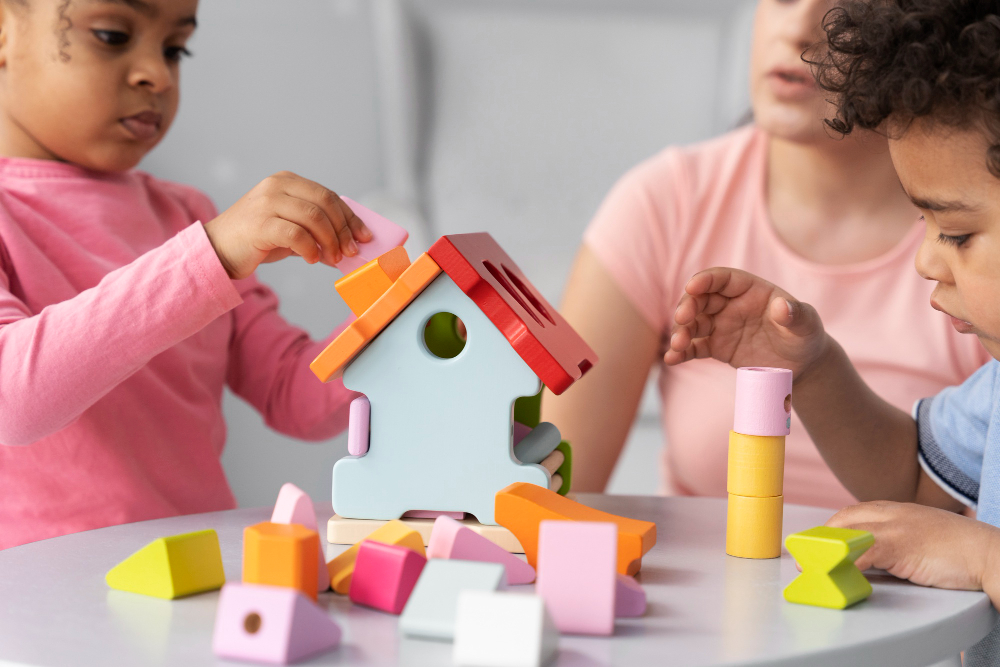Early Childhood Development (ECD): The Foundation of a Healthy, Thriving Life

Early Childhood Development (ECD) refers to the physical, cognitive, social, and emotional growth that occurs in children from birth to age five. This period is marked by rapid brain development and is considered the most critical window for shaping a child’s future. ECD is influenced by a combination of genetic, biological, and environmental factors, including parenting style, nutrition, stimulation, and social interactions.
Key Stats
By the age of 5, a child’s brain reaches approximately 90% of its adult size, laying the foundation for future learning, behavior, and health. However, brain development continues well into adolescence, especially in areas responsible for decision-making and emotional regulation.
(Source: Center on the Developing Child – Harvard University)
Children who attend high-quality early childhood education programs are significantly more likely to graduate from high school and are up to 70% less likely to be arrested for a violent crime later in life, compared to peers who do not receive such care.
(Source: Perry Preschool Project, Center on the Developing Child, and other long-term ECE studies)
Core Areas of ECD
- Cognitive development: Language, memory, problem-solving
- Emotional development: Regulation, empathy, bonding
- Physical development: Motor skills, sensory integration
- Social development: Interpersonal skills, cooperation, attachment
Why ECD is Crucial for Cognitive, Emotional, and Physical Development
Cognitive Development:
- Early neural connections form the base for intelligence and learning capacity.
- Positive early experiences increase the child’s ability to process information, focus, and manage emotions.
Emotional Development:
- Secure attachment builds confidence and reduces the risk of anxiety disorders later in life.
- Emotional neglect can lead to long-term relational and self-regulation issues.
Physical Development:
- Motor skills and coordination are built through play and proper nutrition.
- Lack of stimulation or movement can delay a milestone.
The first five years influence behavior, academic performance, and even adult health
Long-Term Impact of Inadequate ECD: If a child does not receive proper stimulation, care, and love during the early years, the consequences can be devastating and lifelong
Short-Term Effects
- Developmental delays
- Language impairments
- Difficulty forming bonds or trusting adults
Long-Term Effects:
- Increased risk of mental illness
- Poor academic performance
- Higher likelihood of substance abuse and criminal behavior
- Greater health risks, including diabetes, cardiovascular issues, and obesity
Key Insight:
Adverse early experiences can rewire a child’s brain toward survival (fear, aggression) rather than growth (curiosity, creativity

How TransformationWithin Helps Parents Raise Well-Rounded Children
At TransformationWithin, we don’t just help parents “manage behavior.” We help them raise emotionally balanced, resilient, and curious humans — from the inside out.
Conscious Caregiver Reboot – A restorative, neuroscience-informed journey to:
- Unlearn reactive parenting patterns
- Strengthen emotional attunement
- Parent with presence, purpose, and awareness
- We equip caregivers to meet their child’s core needs at every stage of development.
Discipline with Dignity Framework – Discipline doesn’t need to break the spirit. We teach parents to:
- Set clear, respectful boundaries
- Use age-appropriate correction tools
- Nurture emotional safety — without shame, shouting, or fear. “Firm, but kind. Structured, but safe.
The Gut-Brain Thrive Protocol. Your child’s gut affects their:
- Mood
- Focus
- Behavior
- Immunity
Screenwise Parenting System – Digital overload rewires young brains. We empower families to:
- Understand the neuroscience of screen time
- Set healthy limits
- Create tech-free bonding rituals that build connection, creativity, and resilience
Sleep Harmony Blueprint – Sleep is the foundation of behavior and brain growth. We provide step-by-step tools to:
- Restore circadian rhythm
- Build soothing bedtime routines
- Help children feel calmer and more rested — naturally
Self-Worth Seed Planting – We show parents how to plant the seeds of:
- Confidence
- Inner security
- Unshakeable self-esteem
- Using playful rituals, emotional language, and subconscious reinforcement — starting from infancy.
🚨 Toxic Environments and Their Dangers
A toxic environment can silently harm a child’s brain, body, and emotional world.
What Counts as Toxic?
- Loud, chaotic households
- Emotional neglect or abuse
- Physical violence or yelling
- Exposure to drugs, alcohol, or second-hand smoke
- Excessive screen time and overstimulation
Effects on Child Development:
- Elevated cortisol (stress hormone) levels
- Disrupted brain architecture
- Delayed language and reasoning skills
A calm, safe, and emotionally supportive home is non-negotiable for healthy development.
The Dangers of Poor Primary Caregiving
When the child’s primary caregiver is emotionally unavailable, inconsistent, or harsh
Common Behaviors:
- Lack of affection or attention
- Over-punishment or silent treatment
- Unpredictable or absent caregiving
Long-Term Impact:
- Attachment disorders
- Chronic anxiety or codependency
- Low self-esteem and poor emotional regulation
🏫 The Hidden Risks of Daycare & Institutional Care
Not all daycare is harmful — but poorly managed environments can negatively shape development. Risks Include:
⚠️ High child-to-staff ratios → Neglect
⚠️Poor supervision → Bullying or aggression
⚠️ Lack of warmth → Emotional insecurity
🚩 Signs of a Problematic Daycare:
- Dirty or unsafe facilities
- Unresponsive or dismissive staff
- No updates or transparency with parents
- Frequent or unregulated screen use
✅ Look for centers with
- Small group sizes
- Trained and nurturing staff
- Consistent, child-centered routines
- Open parent communication
🔒 The Threat of Abuse & Pedophilia
About Pedophilia: Often committed by trusted individuals | Grooming is subtle and can occur over months
Empowering children with awareness protects them from harm.
Forms of Abuse:
- Physical
- Emotional
- Sexual
- Neglect
Warning Signs in Children:
- Sudden shifts in behavior
- Fear of certain people or places
- Age-inappropriate knowledge of sex or the body
Prevention Starts at Home
- Teach safe vs. unsafe touch
- Keep lines of communication open
- Supervise devices and online access
- Always background-check caregivers, tutors, coaches, and babysitters

When Parenting Skills Are Lacking
Many parents unknowingly harm their children — not out of malice, but through patterns they’ve never been taught to change. Parent coaching, supportive communities, and self-reflection can transform parenting patterns — creating safety and connection at home.
Common Harmful Patterns:
- Verbal abuse, criticism, or name-calling
- Ignoring emotional needs or dismissing feelings
- Inconsistent or unpredictable discipline
- Modeling toxic or unhealthy relationships
Impact on Children:
- Internalized guilt, shame, or anger
- Withdrawal, rebellion, or defiance
- Increased risk of anxiety and mood disorders
Nutrition, Discipline & Development
Brain Development Needs:
- Essential fatty acids, iron, vitamins A, D & B12
- Without these, children face cognitive delays and behavioral challenges
Age-Specific Nutrition Focus
- 0–6 months: Breastmilk
- 6–12 months: Iron-rich purees & soft foods
- 1–5 years: Balanced meals, minimal sugar, plenty of hydration
Physical, Cognitive & Emotional Exercises for Growth
Physical Development:
- Tummy time, crawling, walking, climbing
- Outdoor play for balance, coordination, and muscle tone
Cognitive & Emotional Development:
- Daily read-aloud sessions
- Problem-solving games and puzzles
- Naming emotions & modeling empathy
- Interactive songs and memory games
Discipline Done Right
- Discipline = Guidance, not punishment
- Use consistent, age-appropriate consequences
- Avoid threats, humiliation, or bribes
- Always correct behavior while protecting self-worth
Other Crucial Early Childhood Factors:
- Adequate sleep: 12–14 hrs for toddlers
- Limited screen time: None under 2 years
- Stable routines: Predictability builds security
- Safe exploration: Encourages curiosity and resilience
Why This Matters?
Early Childhood Development (0–5 years) is a sacred window. What happens in these years builds the blueprint for a child’s mental, emotional, and social well-being for life. At Transformationwithin, we equip caregivers with science-backed tools and compassionate guidance to raise strong, emotionally secure, and resilient children.
Our Programmes
Our coaches provide comprehensive interventional support for students through both group and individual program options.
Get In Touch
Reach out to learn more about how we can help, or if you have any questions or concerns
